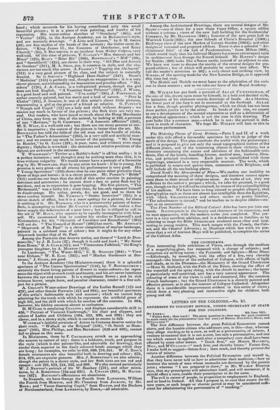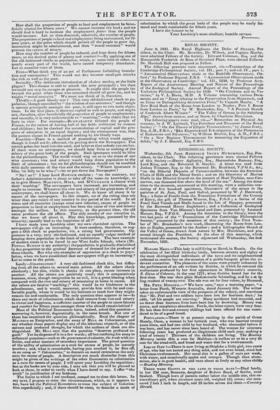LETTERS ON THE COLONIES.-No. XI.
ADDRESSED TO VISCOUNT HOWICR, UNDER-SECRETARY OF STATE FOR THE COLONIES.
Mv LORD--• 8th June 1831. "Fatten first; then teach ! The great question is-how may the poor creatures be made ready for the preventative (not the cure) of Messrs. NALTH us, Mt LL, and. M'CvLiocn 5"
The first difference between the great Political Economists named. above, and the humble citizen who addresses you, is this-that, whereas they allege teaching to be a cure, as well as a preventative, of misery, I venture to contend that it is not a cure, but only a preventative, and one too which cannot be applied until after a temporary cure shall have been effected by some other means. "Teach first," say Messrs. Mai:rims, Mira., and Ill'Cur.r.ocn-" teach first, and thereby fatten." Fatten first, I make bold to suggest-fatten first ; then teach, and thereby prevent the return of misery. Another difference between the Political Economists and myself is, that they have never told us how to administer their medicine,-how to instruct the minds of men whose stomachs are devoured by the gastric juice ; whereas " I am prepared to show," as Mr. WILMOT HORTON says, that my prescription will administer itself, and will moreover, if it should effect a cure, enable their prescription to do the same. _ The evil is excess of people, in proportion to employment in England, and to land in Ireland. All that I propose is, to cure that excess for fif- teen years, or such longer or shorter period as may be considered suffi- cient for administering the preventative of "teaching:'
How shall the proportion of people to land and employment btabene- ficially altered for fifteen years ? We cannot increase the land ; and we should find it hard to increase the employment faster thaa the people would increase. Let. us then diminish, relatively, the number of people. The proportion of people to laud and employment being maintained, for fif- teen years, at the point which should permit all the people to grow fat, instruction might be administered, and then " moral restraint" would prevent the return of misery. Row may the number of people be reduced, and kept down for fifteen years, to the desired point of plenty and comfort ?—By applying one of the old-fashioned checks to population, which, at some time or other, in nearly every part of the world, have caused temporary abundance. Let us examine some of them.
First—What think you of an act of Parliament forbidding inocula- tion and vaccination ? This would not do ; because small-pox attacks the rich as well as the poor.
Secondly—The deliberate introduction of cholera morbus or the little plague? This disease is said to attack the poor. principally ; but then wecould not stop its ravages at pleasure. It might thin the people far beyond the point when those who remained should all grow fat, and be taught "moral restraint." We must not think of it, therefore. Thirdly—A good bloody war ? This very old-fashioned check to po- pulation, though sanctified by" the wisdom of our ancestors," and though it operate principally amongst the poor, is still open to two main objec- tions. In the first place, it destroys capital as well as people, and might not, therefore, alter beneficially the proportion of people to employment ; and secondly, it is very unfavourable to " teaching,"the object that we have in view. For example—BUONAPARTE thinned the people of France, to the extent of having half of her fields cultivated by women and children ; but he checked the accumulation of capital and the pro- gress of education in an equal degree ; and the consequence was, that the poorest classes in France gained nothing by his bloody wars. Fourthly—There is a method of proceeding which would appear, though it would not be, effectual, viz, putting down the Newspapers. The ostrich.pokes her head into the sand, and believes that nobody can see her. If there were no newspapers, we should hear little or nothing of the misery of the great body of the people. Such ignorance would be bliss to the philanthropist. The world would wag on as in the times of our wise ancestors ; vice and misery would keep down population to the limit of subsistence ; but we fat philanthropists should not be troubled with daily accounts of the vice and the misery. "Where ignorance is bliss, 'tis folly to be wise ;"—let us put down the Newspapers !
" No ! no l" I hear Lord HOWICK exclaim ; " on the contrary, my father's Administration is about to take off the taxes on knowledge, so as to give Messrs. Marrlins, MILL, and M‘Cut..Locn a chance with • their teaching.' The newspapers have increased, are increasing, and ought to increase. Whatever the vice and misery of the great mass of our countrymen, we shall know all about it. We do know all about it by means of the newspapers. In this respect, we of the ruling class are wiser than any rulers of any country in any period of the world. In all times and all countries (except some new colonies), excess of people in proportion to land or employment has been the cause of vice and misery amongst the million. In this country, at the present time, the old cause produces the old effects. The only novelty of our situation is, that we know all about it. May this knowledge, possessed by the minority; speedily lead to the happiness of all !" I have made your Lordship utter my own cherished opinion. The newspapers will go on increasing. It were needless, therefore, to sug- gest a fifth check to population, viz, a strong bad government. Op- pression is a very, very old-fashioned, and an equally vulgar method of keeping down population to the limit of subsistence. The best example of modern times is to be found in our West India Islands, where (Mr. POWELL BUXTON is my authority) thepopulation is gradually diminished in due proportion to the gradual decrease of demand for the produce of those islands. But why cite examples of oppression as a check to popu- lation, when we have established that newspapers will go on increasing ? Let us come to the point.
Lastly—CotosuzATIow ? A very old-fashioned check this, but differ- ing from all the others in several main points. All the others check
absolutely ; but this, whilst it checks in one place, causes increase in another. All the others are positively cruel; this is comparatively humane, since, though emigration be an evil, it is a great blessing when compared with the vice and misery of remaining at home in excess. All the others are fatal to " teaching ;' this would be no hindrance to the schoolmaster, and it would, moreover, provide him with fat and com-
fortable pupils, whom it would be his business to teach how they might remain fat and comfortable. The only question then appears to be—Is there any mode of colonization which shall remove from vice and misery to virtue and happiness, a sufficient number of the people to cause fatness and comfort for fifteen years amongst those who should remain behind ?
Most of the Political Economists have, indeed, asked this question— answering it, however, dogmatically, in the same breath. Not one of them has examined the question philosophically. Read the chapter of Maurnus on Emigration, and the 'essay of MILL on Colonization, and say whether those papers display any of the laborious research, or of the earnest and profound thought, for which the authors of them are dis- tinguished. Mr. Mir.a says that the question "deserves profound re- gard." Yet he disposes of it in a few words; all but confining his essay to
'collateral questions—such as the government of colonies, the trade with co- lonies, and other matters of secondary importance. The grand question of the utility of colonization as a cure for excess of people, he scarcely
touches ; and, what is remarkable, having just touched it, he flies off,
in an essay on " Colonization," to descant on moral restraintas the only cure for excess 'of people. A description not much dissimilar from this
'might be given of the writings of the other Economists on colonization as a cure for excess of people. I will spare your Lordship the repetition ; but as the books are by your side, I may ask that you will be pleased to look at them, in order to verify what I have dared to say.- I offer "the truth" in justification of my boldness.
The limits to which I am confined, compel me to close this letter. In my next, I propose to state the 'circumstances, which, as it appears to me, have led the Political Economists to treat the subject of Coloniza- tion superficially; and, if there should be room, to describe a mode of
colonization by which the great body of the people may be easily fat- tened and made comfortable for fifteen years.
I have the honour to be Your Lordship's most obedient, humble servant



























 Previous page
Previous page